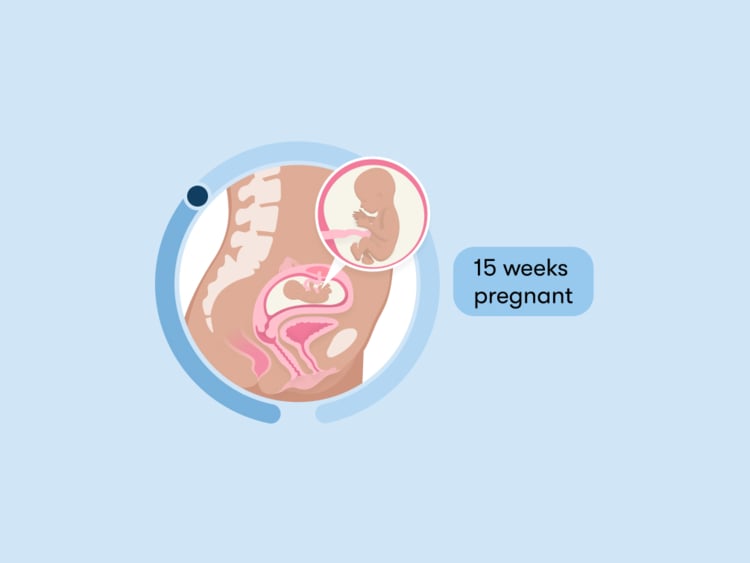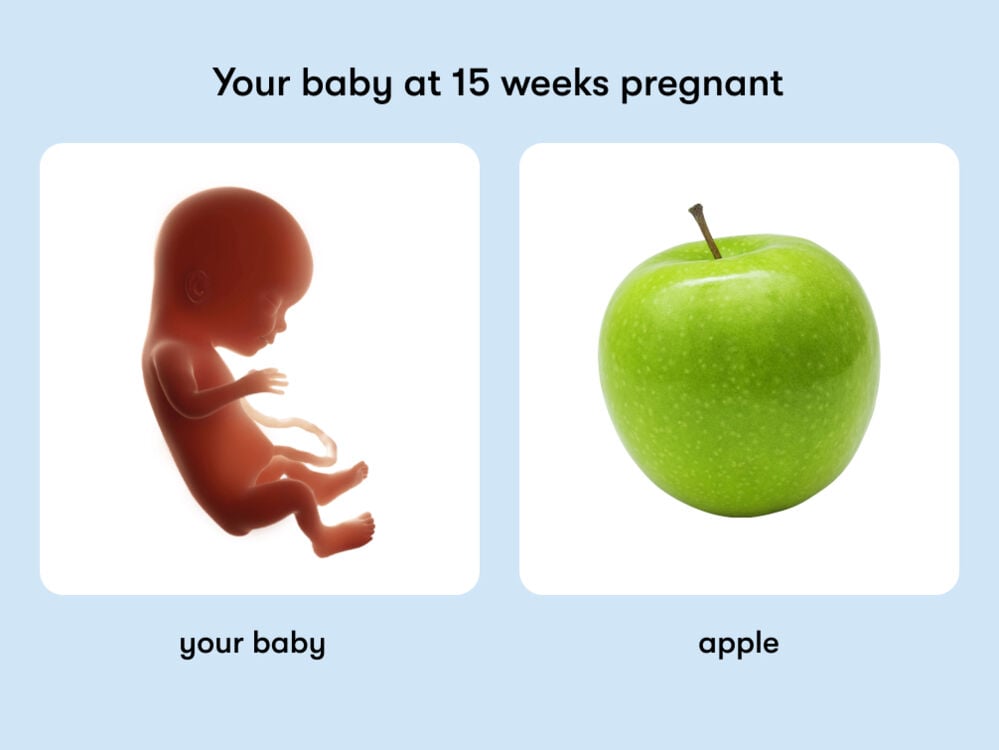From hearing development to quickening, here’s the lowdown on being 15 weeks pregnant.
-
Tracking cycle
-
Getting pregnant
-
Pregnancy
-
Help Center
-
Flo for Partners
-
Anonymous Mode
-
Flo app reviews
-
Flo Premium New
-
Secret Chats New
-
Symptom Checker New
-
Your cycle
-
Health 360°
-
Getting pregnant
-
Pregnancy
-
Being a mom
-
LGBTQ+
-
Quizzes
-
Ovulation calculator
-
hCG calculator
-
Pregnancy test calculator
-
Menstrual cycle calculator
-
Period calculator
-
Implantation calculator
-
Pregnancy weeks to months calculator
-
Pregnancy due date calculator
-
IVF and FET due date calculator
-
Due date calculator by ultrasound
-
Medical Affairs
-
Science & Research
-
Pass It On Project New
-
Privacy Portal
-
Press Center
-
Flo Accuracy
-
Careers
-
Contact Us
15 weeks pregnant: Your guide to this week of your second trimester


Every piece of content at Flo Health adheres to the highest editorial standards for language, style, and medical accuracy. To learn what we do to deliver the best health and lifestyle insights to you, check out our content review principles.
At 15 weeks pregnant, you’re settling into your second trimester and likely very curious about how your baby and body are developing. Whether you’re experiencing new pregnancy symptoms, feel the same as you did in the first trimester, or currently have no symptoms at all, it’s important to remember that every pregnancy is different — so try not to compare yourself to others.
We’ve outlined some of the things you might be experiencing below, to give you an idea of what could be in store for you at 15 weeks pregnant, with some advice from a Flo expert.
Your baby at 15 weeks pregnant
Developing hearing
By 15 weeks pregnant, it’s likely that your baby can hear your voice as their hearing develops — a lovely milestone in your relationship. They may also be able to hear your heartbeat, your tummy gurgles, and some muted sounds from the outside world. It’s early days for their ears though, which won’t be physically defined until around 18 weeks.
Starting to form eyelashes
This week your baby is also starting to form teeny tiny eyelashes, which will become more pronounced by 28 weeks.
How big is a baby at 15 weeks?
Length (crown to heel): 16.7 cm or 6.6 in.
Weight: 117 g or 4.1 oz.
Size: Equivalent to an apple
All measurements are approximate and vary within the normal range.

Your body at 15 weeks pregnant
Increased vaginal discharge
At 15 weeks pregnant, you might notice that you’re producing more vaginal discharge than usual. This is thanks to the increased blood flow to the pelvic area. While it might be a little uncomfortable, the extra discharge is actually beneficial, as it can provide more protection against any potential infections. Clever, huh?
However, it’s worth nothing that if you notice any of the following discharge symptoms, you should get in touch with your doctor:
- It smells unpleasant/strange.
- It is green or yellow.
- Your vagina feels itchy or sore.
- You have pain or burning when you pee.
These symptoms could be the sign of a vaginal infection, which are more common during pregnancy. Your doctor will be able to run some tests and discuss any necessary treatment options with you.
Weight gain
You may also notice that you’ve gained a bit more weight by 15 weeks. Many women feel anxious and stressed about putting on weight in pregnancy, so if you’re concerned, know that you’re not alone. Remember that the amount of weight you should gain in pregnancy depends on your body mass index and health before you got pregnant. This means that weight gain during pregnancy will vary greatly between different people, so as hard as it can be, try not to compare yourself to others. The same goes for the size of your bump. Whether your pregnancy shows at 15 weeks will differ from person to person.
So don’t worry about whether or not you’ve achieved the “average” amount of weight gain for this stage. Everyone is different, and your doctor will make sure you’re gaining the right amount of weight for you at your prenatal visits. And remember, if you have any concerns about your weight or your belly at 15 weeks pregnant, it’s always worth having a chat with your doctor.
Take a quiz
Find out what you can do with our Health Assistant
Your questions answered
What does a baby look like at 15 weeks?
At 15 weeks pregnant, your baby is only the size of an apple. However, they already have a soft layer of hair all over their body. This hair, called lanugo, protects your baby’s skin and keeps them warm inside your uterus. Most babies shed lanugo during the final 8 weeks of pregnancy, while others will shed it a few weeks after birth. As well as growing eyebrows and eyelashes, this week baby girls will be growing their ovaries.
Can you feel your baby at 15 weeks?
While some women can feel their baby moving as early as 16 weeks, many don’t experience this until up to 24 weeks. It’s natural not to feel any movement at this stage, so there’s no need to worry if you haven’t felt your baby move just yet. If this is your first baby, it’s common to not experience your baby’s first movements — also called quickening — until 20 weeks.
If you have experienced some movement, it might feel like bubbles, flutters, or tiny pulses. Quickening can be hard to distinguish at first, but you’ll get better at recognizing it as time goes on. The movements will tend to get stronger throughout your pregnancy, too.
Is 15 weeks the same as 4 months pregnant?
When you’re 15 weeks pregnant, you’re in your fourth month of pregnancy. “Many people average a month to be around 4 weeks, so 15 weeks would be nearing ‘4 months’ pregnant,” explains Dr. Jenna Beckham, obstetrician and gynecologist, WakeMed, North Carolina, US.
Your 15 weeks pregnant checklist
Chat with your baby
With your baby’s hearing developing at this stage, now is a great time to start talking to your bump. You might feel silly doing this at first, but you’ll soon get used to it and may even enjoy it. Talking or even singing to your growing baby can help to tune up their hearing, preparing them for when they are old enough to start talking.
“Talking to the fetus can have benefits such as strengthening the nervous system, improving development of sense of hearing, and stimulating language development,” says Dr. Beckham. “It may also have a calming effect and positively impact the bond between the fetus and pregnant person.”
You might want to invite your partner or other family and friends to start talking to your bump, too. This can help them bond with your baby, who will be able to get to know their voices while feeling safe and secure.
When to consult a doctor at 15 weeks pregnant
During your second trimester, you may have prenatal appointments with your doctor every four weeks. How regularly you see your doctor depends on where you live and your pregnancy needs. At these checkups, your doctor will:
- Track your baby’s growth and development
- Carry out your quad screen, which is a blood test that happens between 15 and 20 weeks of pregnancy to determine if your baby is showing signs of having Down syndrome or other genetic disorders
- Perform an alpha-fetoprotein test, which tests for genetic disorders and neural tube defects
- Do a urine test to check for a number of conditions, including infections, a kind of protein that may indicate preeclampsia, and glucose, which may indicate hyperglycemia
- You might also have an ultrasound during some of the appointments.
You don’t need to wait until your appointment if you have any concerns or questions about your pregnancy. However, at 15 weeks pregnant, you should contact your doctor immediately if you experience:
- Severe cramping
- Vaginal bleeding
- Changes in vaginal discharge
- Fever
- Dizziness or fainting
- Severe vomiting
This isn’t an exhaustive list and just an example of some of the changes you should look out for. Some of these can be a sign of miscarriage or other health complications, so it’s essential that you speak to your doctor about the best next step for you. And if you’re ever worried about any other symptoms you experience during pregnancy, then don’t hesitate to reach out to your health care provider.
15 weeks pregnant: The takeaway
Every woman’s pregnancy will look different at 15 weeks. Some women will notice more vaginal discharge at this stage, and some will show more of a bump than others. Every pregnancy will develop at its own pace. After all, your body is creating a whole new human from scratch! So be sure to embrace your journey no matter how it’s unfolding.


Hey, I'm Anique
I started using Flo app to track my period and ovulation because we wanted to have a baby.


The Flo app helped me learn about my body and spot ovulation signs during our conception journey.


I vividly
remember the day
that we switched
Flo into
Pregnancy Mode — it was
such a special
moment.
Real stories, real results
Learn how the Flo app became an amazing cheerleader for us on our conception journey.
References
“Alpha-Fetoprotein (AFP) Test.” Cleveland Clinic, my.clevelandclinic.org/health/diagnostics/24301-alpha-fetoprotein-test. Accessed 15 June 2023.
“Attachment and Bonding during Pregnancy.” NHS Inform, 25 Jan. 2023, www.nhsinform.scot/ready-steady-baby/pregnancy/relationships-and-wellbeing-in-pregnancy/attachment-and-bonding-during-pregnancy.
Curran, Mark A. “Fetal Development.” Perinatology.com, perinatology.com/Reference/Fetal%20development.htm. Accessed 15 June 2023.
“Bleeding during Pregnancy.” The American College of Obstetricians and Gynecologists, May 2021, www.acog.org/womens-health/faqs/bleeding-during-pregnancy.
“Discharge in Pregnancy.” Tommy’s, www.tommys.org/pregnancy-information/pregnancy-symptom-checker/discharge-pregnancy. Accessed 15 June 2023.
“Fetal Development: What Happens during the 2nd Trimester?” Mayo Clinic, 3 June 2022, www.mayoclinic.org/healthy-lifestyle/pregnancy-week-by-week/in-depth/fetal-development/art-20046151.
"Fetal Development.” Cleveland Clinic, my.clevelandclinic.org/health/articles/7247-fetal-development-stages-of-growth. Accessed 15 June 2023.
Friel, Lara A. “Fevers during Pregnancy.” MSD Manual Consumer Version, Oct. 2021, www.msdmanuals.com/home/women-s-health-issues/pregnancy-complicated-by-disease/fevers-during-pregnancy.
“Lanugo.” Cleveland Clinic, my.clevelandclinic.org/health/body/22487-lanugo. Accessed 15 June 2023.
Moncada-Madrazo, Mariana, and Cristobal Rodríguez Valero. “Embryology, Uterus.” StatPearls, StatPearls Publishing, 2022, www.ncbi.nlm.nih.gov/books/NBK547748/.
“Morning Sickness: Nausea and Vomiting of Pregnancy.” The American College of Obstetricians and Gynecologists, May 2020, www.acog.org/womens-health/faqs/morning-sickness-nausea-and-vomiting-of-pregnancy.
“My Bump Is Too Small.” Tommy’s, www.tommys.org/pregnancy-information/pregnancy-symptom-checker/my-baby-not-growing-pregnancy. Accessed 15 June 2023.
“Nutrition during Pregnancy.” The American College of Obstetricians and Gynecologists, May 2023, www.acog.org/womens-health/faqs/nutrition-during-pregnancy.
“Prenatal Care: 2nd Trimester Visits.” Mayo Clinic, 4 Aug. 2022, www.mayoclinic.org/healthy-lifestyle/pregnancy-week-by-week/in-depth/prenatal-care/art-20044581.
“Quad Screen: Second Trimester Screening, Quad Marker Screening.” Cleveland Clinic, my.clevelandclinic.org/health/diagnostics/4698-pregnancy-quad-marker-screen. Accessed 15 June 2023.
“Quickening in Pregnancy: First Movements & What to Expect.” Cleveland Clinic, my.clevelandclinic.org/health/symptoms/22829-quickening-in-pregnancy. Accessed 15 June 2023.
Thomas, Melanie, et al. “Potential for a Stress Reduction Intervention to Promote Healthy Gestational Weight Gain: Focus Groups with Low-Income Pregnant Women.” Women’s Health Issues, vol. 24, no. 3, May 2014, pp. E305–11, www.ncbi.nlm.nih.gov/pmc/articles/PMC4074576/.
“The Second Trimester.” Johns Hopkins Medicine, 8 Aug. 2021, www.hopkinsmedicine.org/health/wellness-and-prevention/the-second-trimester.
“Urgent Maternal Warning Signs.” Centers for Disease Control and Prevention, 27 Feb. 2023, www.cdc.gov/hearher/maternal-warning-signs/index.html.
“Vaginal Discharge during Pregnancy: Your Questions Answered.” NCT, 1 June 2011, www.nct.org.uk/pregnancy/worries-and-discomforts/common-discomforts/vaginal-discharge-during-pregnancy-your-questions-answered.
“Vaginal Discharge in Pregnancy.” NHS, www.nhs.uk/pregnancy/related-conditions/common-symptoms/vaginal-discharge/. Accessed 14 June 2023.
“Vaginal Discharge in Pregnancy.” NHS, www.nhs.uk/pregnancy/related-conditions/common-symptoms/vaginal-discharge. Accessed 15 June 2023.
“Vulvovaginal Health.” The American College of Obstetricians and Gynecologists, Jan. 2020, www.acog.org/womens-health/faqs/vulvovaginal-health.
“Weight Gain in Pregnancy.” NHS, www.nhs.uk/pregnancy/related-conditions/common-symptoms/weight-gain/. Accessed 15 June 2023.
“You and Your Baby at 15 Weeks Pregnant.” NHS, www.nhs.uk/pregnancy/week-by-week/13-to-27/15-weeks/. Accessed 15 June 2023.
“Your Baby’s Movements.” NHS, www.nhs.uk/pregnancy/keeping-well/your-babys-movements/. Accessed 15 June 2023.
“15 Weeks Pregnant: Week-by-Week Guide.” NHS, www.nhs.uk/start4life/pregnancy/week-by-week/2nd-trimester/week-15/. Accessed 15 June 2023.
History of updates
Current version (05 July 2023)
Published (24 February 2019)
In this article

Get your personal guide to pregnancy with the Flo app
-
Follow your baby's growth week by week
-
Get expert info on symptoms, safe foods, and more
-
Chat with other parents-to-be




